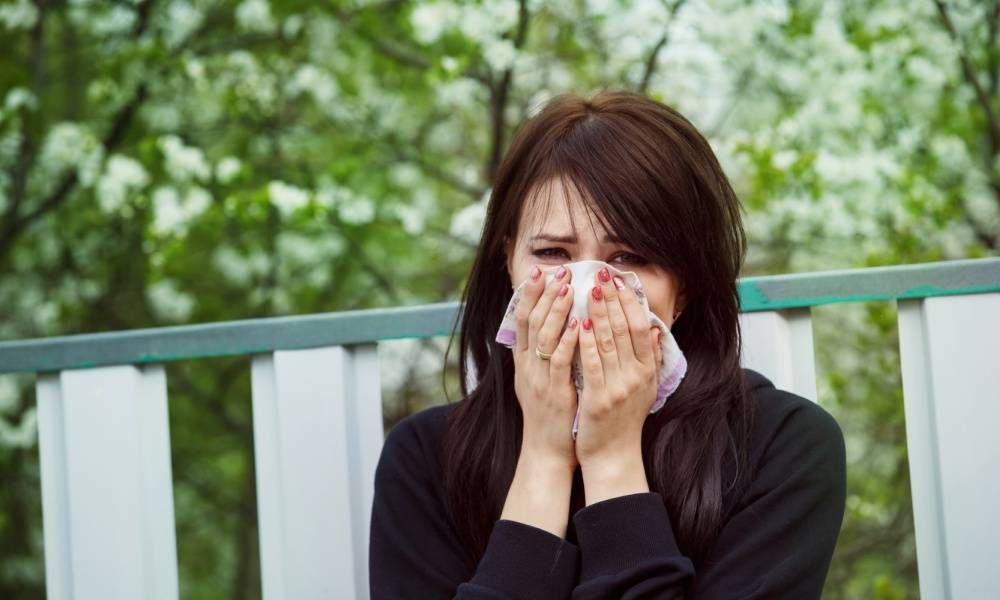Common allergy triggers
No matter if you suffer from
seasonal allergies or year-round allergy symptoms, it can take a real toll on your body, and it may get in the way of quality of life. Allergies can affect an estimated millions of people worldwide and it is still increasing every year. Have you ever thought why and how do people find the cause of allergies?

Common allergy symptoms
- Sneezing
- Nasal congestion
- Wheezing
- Coughing
- Itchy, watery eyes and skin
- Itchy throat
- Runny nose
- Stomach ache
- Hives
- Irritability
- Fatigue
Popular allergy triggers
Anything that can be eaten, touched or inhaled is a potential allergen. Most of the allergy sufferers are generally aware of their triggers and they do their best to avoid them. But not all the triggers are as obvious as a peanut allergy! A potential allergen affects you depends on your genetics, a range of potential factors like your lifestyle, physical environment, diet and the strength of your
immune system.
Mould

The most common allergic triggers are house pollen, pets, and mold. While allergy avoidance measures may help to reduce the exposure to allergen triggers, using
medications (if any) as directed is an effective way of dealing with your allergy.
Exposure to the indoor as well as outdoor areas that are damp and have mold can trigger your
allergic symptoms. Mould is commonly found in fridges and bathrooms. It is also found in places with little air circulation, for instance, built-in and walk-in wardrobes, and also in bedrooms with en suite bathrooms.
Prevention
- Using high-efficiency air filters that are integrated within stand-alone air purifiers
- Sealing leaks in bathrooms and roofs
- Ensuring adequate natural ventilation which is including the use of extractor fans
- Removing indoor pot plants (which promote mold growth)
- Clearing overflowing gutters and blocked under floor vents
- Treating rising damp as soon as it is detected
- Drying or removing wet carpets
Dust Mites

They are microscopic creatures which feed off human skin scales. Dust mites are one of the most common allergen triggers for asthma, particularly in coastal and humid parts.
They usually live in soft furnishings like beds, carpets, upholstered furniture, bedding, soft toys as well as clothing, and they’re mostly found in homes rather than public places.
They aren’t usually in the air and only become airborne amid and after dust-raising activities like dusting and vacuuming.
Prevention
- Reduce your exposure from dust mites
- Expose your curtains to Sun
- Wash sheets and pillowcases weekly using hot water
- Remove untreated underlays
- Vacuum carpets and soft furnishings every week
- Remember to clean window coverings
Pets

Dogs, cats, guinea pigs, horses, rabbits, mice, and rats can all trigger allergy and asthma in some people. However, avoiding pet allergens can be the daunting task to adopt if the person is an animal-lover. Allergens are stuck to the hair and skin of pets and become airborne when the pet sheds their hair. They can remain airborne for some time.
Dogs and cats are a major source of allergens at home. The allergens can come from the sweat glands in cats as well as
salivary glands in dogs. All cats and dogs have salivary and sweat glands there are no breeds that don’t contain allergens, even though the amount of allergen released can be different between breeds.
Unfortunately, Cat allergen is pretty hard to remove from houses as it can remain in the house for months even after the cat is removed. They can be found in places where cats have never lived such as – carried around on clothing to offices or schools.
Prevention:
- Always wash your hands after touching your pet
- Never let your pet into the bedroom
- Keep your pet outside most or all of the time but ensure they have a warm, safe home outdoors
- After resetting your pet outside, ensure cleaning your house thoroughly to remove sticky allergens that are left behind
- Ask someone else to groom your pet
- Vacuum carpets and upholstery regularly
- Don’t wash your pet more than your vet recommends
Smoke

Smoking yourself or breathing in other people’s smoke can damage your lungs, make your asthma harder to manage, increases your risk of asthma attacks or flare-ups. As well as saving what you have spent on cigarettes, quitting smoking can even mean you need to take less allergic medications. That is, in fact, saving you money twice over!
Prevention
- Keep yourself and your kids smoke-free
- Avoid inhaling any smoke that may harm your lungs or make your condition worse
- Quit smoking completely, speak to your healthcare professional and take professional guidance to quit the habit
Other Common Allergy Triggers
- Soap
- Stuffed Toys
- Pollan
- Chemicals
- Plants
- Dust
- Latex
- Insect stings
- Food & medication
What about Seasonal Allergies?
Most of the people blame pollen for their seasonal allergies, however, the truth lies in the immune systems. Immune systems produce antibodies which prevent infection as well as protect us from getting sick. But when you have any allergies, your immune system may react to things like pollen, grass, pet dander, or dust since it is perceived as harmful. Having said that, the root cause of your allergy symptoms are actually your body’s overreaction to certain triggers!
In order to prevent allergic reactions, ensure avoiding avoid problematic foods even in small amounts, keep yourself clean and avoid chemicals and dusty environments. Additionally, if your allergic symptoms don’t go away, or if you are experiencing any severe symptoms visit a health care professional ASAP for consultation.


 The most common allergic triggers are house pollen, pets, and mold. While allergy avoidance measures may help to reduce the exposure to allergen triggers, using medications (if any) as directed is an effective way of dealing with your allergy.
Exposure to the indoor as well as outdoor areas that are damp and have mold can trigger your allergic symptoms. Mould is commonly found in fridges and bathrooms. It is also found in places with little air circulation, for instance, built-in and walk-in wardrobes, and also in bedrooms with en suite bathrooms.
The most common allergic triggers are house pollen, pets, and mold. While allergy avoidance measures may help to reduce the exposure to allergen triggers, using medications (if any) as directed is an effective way of dealing with your allergy.
Exposure to the indoor as well as outdoor areas that are damp and have mold can trigger your allergic symptoms. Mould is commonly found in fridges and bathrooms. It is also found in places with little air circulation, for instance, built-in and walk-in wardrobes, and also in bedrooms with en suite bathrooms.
 They are microscopic creatures which feed off human skin scales. Dust mites are one of the most common allergen triggers for asthma, particularly in coastal and humid parts.
They usually live in soft furnishings like beds, carpets, upholstered furniture, bedding, soft toys as well as clothing, and they’re mostly found in homes rather than public places.
They aren’t usually in the air and only become airborne amid and after dust-raising activities like dusting and vacuuming.
They are microscopic creatures which feed off human skin scales. Dust mites are one of the most common allergen triggers for asthma, particularly in coastal and humid parts.
They usually live in soft furnishings like beds, carpets, upholstered furniture, bedding, soft toys as well as clothing, and they’re mostly found in homes rather than public places.
They aren’t usually in the air and only become airborne amid and after dust-raising activities like dusting and vacuuming.
 Dogs, cats, guinea pigs, horses, rabbits, mice, and rats can all trigger allergy and asthma in some people. However, avoiding pet allergens can be the daunting task to adopt if the person is an animal-lover. Allergens are stuck to the hair and skin of pets and become airborne when the pet sheds their hair. They can remain airborne for some time.
Dogs and cats are a major source of allergens at home. The allergens can come from the sweat glands in cats as well as salivary glands in dogs. All cats and dogs have salivary and sweat glands there are no breeds that don’t contain allergens, even though the amount of allergen released can be different between breeds.
Unfortunately, Cat allergen is pretty hard to remove from houses as it can remain in the house for months even after the cat is removed. They can be found in places where cats have never lived such as – carried around on clothing to offices or schools.
Dogs, cats, guinea pigs, horses, rabbits, mice, and rats can all trigger allergy and asthma in some people. However, avoiding pet allergens can be the daunting task to adopt if the person is an animal-lover. Allergens are stuck to the hair and skin of pets and become airborne when the pet sheds their hair. They can remain airborne for some time.
Dogs and cats are a major source of allergens at home. The allergens can come from the sweat glands in cats as well as salivary glands in dogs. All cats and dogs have salivary and sweat glands there are no breeds that don’t contain allergens, even though the amount of allergen released can be different between breeds.
Unfortunately, Cat allergen is pretty hard to remove from houses as it can remain in the house for months even after the cat is removed. They can be found in places where cats have never lived such as – carried around on clothing to offices or schools.
 Smoking yourself or breathing in other people’s smoke can damage your lungs, make your asthma harder to manage, increases your risk of asthma attacks or flare-ups. As well as saving what you have spent on cigarettes, quitting smoking can even mean you need to take less allergic medications. That is, in fact, saving you money twice over!
Smoking yourself or breathing in other people’s smoke can damage your lungs, make your asthma harder to manage, increases your risk of asthma attacks or flare-ups. As well as saving what you have spent on cigarettes, quitting smoking can even mean you need to take less allergic medications. That is, in fact, saving you money twice over!



